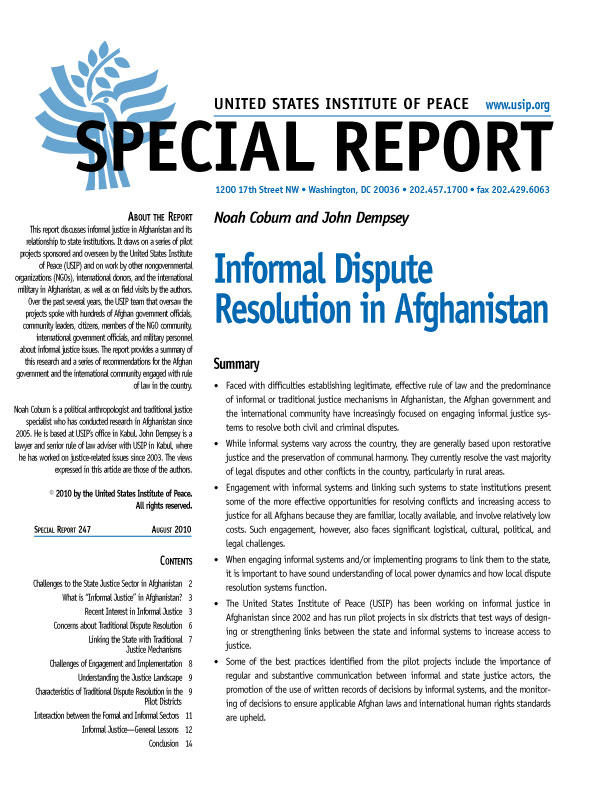This report discusses informal justice in Afghanistan and its relationship to state institutions. It draws on a series of pilot projects sponsored and overseen by the United States Institute of Peace (USIP) and on work by other nongovernmental organizations (NGOs), international donors, and the international military in Afghanistan, as well as on field visits by the authors.

Summary
- Faced with difficulties establishing legitimate, effective rule of law and the predominance of informal or traditional justice mechanisms in Afghanistan, the Afghan government and the international community have increasingly focused on engaging informal justice systems to resolve both civil and criminal disputes.
- While informal systems vary across the country, they are generally based upon restorative justice and the preservation of communal harmony. They currently resolve the vast majority of legal disputes and other conflicts in the country, particularly in rural areas.
- Engagement with informal systems and linking such systems to state institutions present some of the more effective opportunities for resolving conflicts and increasing access to justice for all Afghans because they are familiar, locally available, and involve relatively low costs. Such engagement, however, also faces significant logistical, cultural, political, and legal challenges.
- When engaging informal systems and/or implementing programs to link them to the state, it is important to have sound understanding of local power dynamics and how local dispute resolution systems function.
- The United States Institute of Peace (USIP) has been working on informal justice in Afghanistan since 2002 and has run pilot projects in six districts that test ways of designing or strengthening links between the state and informal systems to increase access to justice.
- Some of the best practices identified from the pilot projects include the importance of regular and substantive communication between informal and state justice actors, the promotion of the use of written records of decisions by informal systems, and the monitoring of decisions to ensure applicable Afghan laws and international human rights standards are upheld.
About the Report
This report discusses informal justice in Afghanistan and its relationship to state institutions. It draws on a series of pilot projects sponsored and overseen by the United States Institute of Peace (USIP) and on work by other nongovernmental organizations (NGOs), international donors, and the international military in Afghanistan, as well as on field visits by the authors. Over the past several years, the USIP team that oversaw the projects spoke with hundreds of Afghan government officials, community leaders, citizens, members of the NGO community, international government officials, and military personnel about informal justice issues. The report provides a summary of this research and a series of recommendations for the Afghan government and the international community engaged with rule of law in the country.
Noah Coburn is a political anthropologist and traditional justice specialist who has conducted research in Afghanistan since 2005. He is based at USIP’s office in Kabul. John Dempsey is a lawyer and senior rule of law adviser with USIP in Kabul, where he has worked on justice-related issues since 2003. The views expressed in this article are those of the authors.